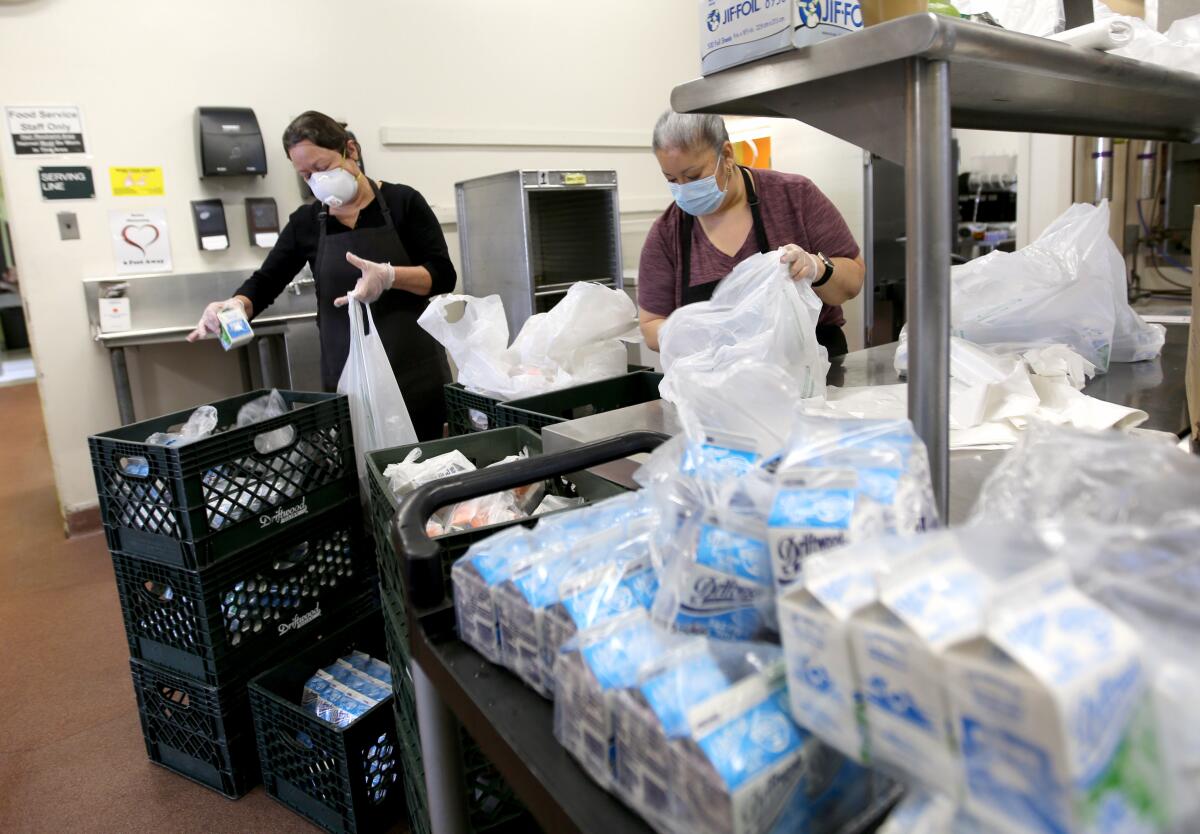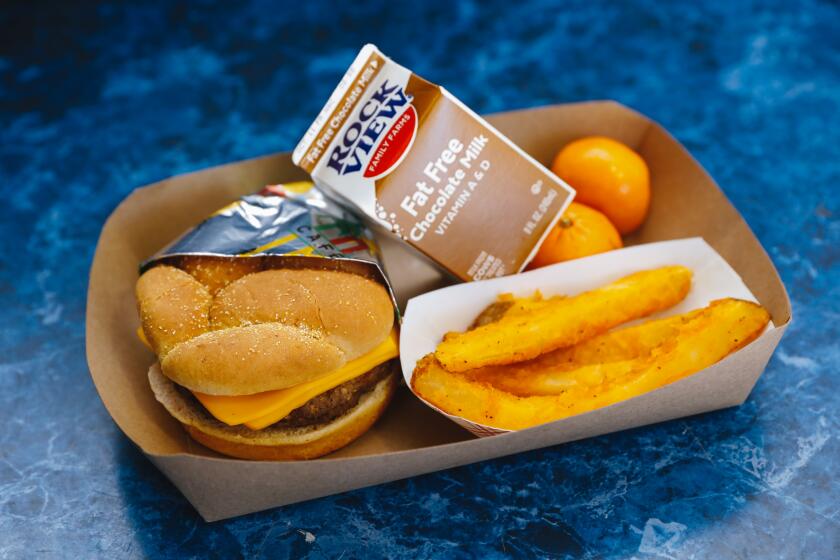Editorial: Got free speech? An LAUSD student is restricted from promoting non-dairy milk

- Share via
Got milk? Remember the catchy ads featuring celebrities with milk mustaches from the 1990s? The advertising campaign by the California Milk Processor Board has been revamped for the 21st century using social media influencers targeting younger generations, specifically Gen Z.
It’s one of several efforts by the dairy industry to encourage kids to drink milk. But it has an even more powerful tool to reach school-age consumers: federal rules for schools participating in the National School Lunch Program that favor dairy milk over other beverages, including prohibiting schools from “directly or indirectly restricting the sale or marketing of dairy milk on school premises.”
Marielle Williamson, a student at Eagle Rock Junior/Senior High School, found out about the U.S. Department of Agriculture restrictions this year when she was prohibited from handing out literature at school about the disadvantages of drinking dairy milk unless she also provided information about its benefits. Williamson is a vegan and decided she’d rather not promote dairy milk. Last week, she joined a lawsuit filed by the national nonprofit advocacy group Physicians Committee for Responsible Medicine accusing the USDA, the Los Angeles Unified School District and school administrators of violating her free speech rights.
Free school meals should be tasty, but nutrition is more important. New USDA guidelines should keep this in mind.
Good for Williamson to challenge the long-standing rules that unfairly protect the nation’s dairy industry from competition. Williamson, 17, believes the USDA rules prioritize an industry’s profits over students’ health considering that many students are lactose-intolerant, a digestive condition that causes bloating, diarrhea, nausea and other symptoms. It affects primarily people who are Black, Latino, Native American and Asian American, according to the National Institute of Diabetes and Digestive and Kidney Diseases.
In California, the majority of public school students are part of these communities. Yet public schools are not required to offer nondairy milk options as part of free school meals. They can provide water, but the USDA has made it clear that schools cannot encourage students to drink water instead of milk. Currently, students receiving free school meals can obtain nondairy milk options by providing a doctor’s note, a requirement that can be burdensome for lower-income families. It would make more sense if students could freely have these options without having to jump through administrative hoops.
Williamson was an intern last summer at the Factory Farming Awareness Coalition, where she learned how the farming industry negatively affects people of color, including the higher likelihood of lactose intolerance among those groups. In October, administrators at her school gave her permission to set up a table during lunch to hand out samples of oat milk and pea protein milk while discussing the benefits of nondairy milk.
If students in local public schools refused to quench their thirst with water, would the schools offer them soda instead?
She wanted to hold a similar event in April, but since the October event she found out about the USDA’s dairy milk provision. Williamson, who is due to graduate this year from the International Baccalaureate academic program, didn’t want to get in trouble so she specifically sought assurance that her event would not violate the provision. The school principal, after consulting with his supervisors, told her she could do the event but that she would also have to dispense information about the benefits of dairy milk.
The courts will have to decide whether Williamson’s 1st Amendment rights were violated, but it doesn’t take a judge to understand that these rules were created to benefit a specific industry and not necessarily to promote children’s health. Even if it’s not unconstitutional, it’s a rule that doesn’t make sense at a time when many people prefer plant-based milk over cow‘s milk for health and personal reasons.
The USDA has been helping market the dairy industry since at least 1919, when the government agency successfully launched campaigns about milk surpluses resulting from increased production of dairy products during World War I. The powerful dairy industry has fought to keep milk in schools even though consumption has gone down. In 2022, the dairy industry spent more than $7 million in lobbying efforts. For example, it lobbied for the passage of the School Milk Nutrition Act of 2021 to allow schools to offer low-fat flavored milk, according to nonprofit Open Secrets, which tracks money in politics.
Young people who drink milk are more likely to continue drinking milk into adulthood, according to a 2021 study of milk consumption habits by the USDA’s Economic Research Service. It makes sense that the dairy industry would want to capture this market during their school years. Promoting the health benefits of milk, however, should not come at the expense of students’ free speech rights or their health. Schools offering free school meals should make it easier — not harder — for students to choose what is better for their health.
More to Read
A cure for the common opinion
Get thought-provoking perspectives with our weekly newsletter.
You may occasionally receive promotional content from the Los Angeles Times.











